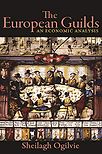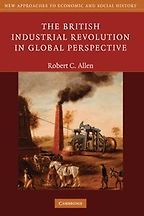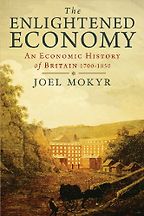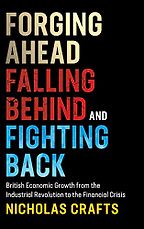Before we get to the books about the Industrial Revolution you’ve chosen, could you just tell us what it was and when it was?
It’s traditionally the expression used to describe a period of rapid technological advance which started in eighteenth-century Britain—as one student put it, around 1760 ‘a wave of gadgets swept over England’. The shorthand term Industrial Revolution refers to what happened in England, but it soon spread to other parts of Europe. By the 1790s you see Scotland, Belgium and parts of Switzerland, France, and Germany experiencing this growth of technologically advanced manufacturing .
But it did all kick off in England. In the 1760s you see a lot of new industrial patents being taken out. You see a move towards centralised production in factories, using water power initially, but subsequently steam power, and you see new machines, either replacing human labour or using human labour in different ways. At first it just happened in a few places, especially in the north and the Midlands, and affected just a few sectors of the economy. The impact on the economy as a whole was much more gradual than was traditionally assumed, so some have argued that it should be called the Industrial Evolution. But though it was slow, it turned out to be unstoppable – and that’s why I think it’s right to go on calling it a revolution.
The reason that we’re so interested in the British Industrial Revolution is that it’s the first time in human history that an economy made the transition to self-sustaining economic growth. There are lots of periods of growth in different areas, like Song China between the 10th and 13th century, but something always happened to choke them off. The growth that started during the Industrial Revolution never stopped and ultimately spread across the world.
And were its protagonists aware that they were doing something remarkable at the time?
Most of them weren’t. There were famous economists like Thomas Malthus, who was writing his influential Essay on the Principle of Population in 1798, based on the idea of a predominantly agricultural economy, even though the Industrial Revolution had been going on then for more than a generation. Malthus argued that population, when unchecked, would grow geometrically while food supply could at best rise arithmetically. He was writing this at exactly the time when the Industrial Revolution was making his analysis obsolete in the country where he lived. So there were brilliant economists at the time who were apparently oblivious of the Industrial Revolution.
“Some have argued that it should be called the Industrial Evolution”
On the other hand, some contemporaries did notice that things were changing. There were grumpy people in the eighteenth century complaining about how women were working outside the household, poor people were marrying without inheriting land, every servant in England was now wearing fancy cotton scarves—that sort of thing. People were migrating into the cities, eating fast food instead of cooking at home, hanging out in coffee-houses, mothers were drinking gin and labourers failing to doff their caps.
But in every society everywhere, ‘Disgusted of Tunbridge Wells’ is always saying how much better things were in the old days. People at the time noted a lot of individual changes in behaviour, but I don’t think they realised that this not only was different from anything that had happened before, but would go on becoming more and more different.
Let’s move on to the books you’ve recommended on the Industrial Revolution. Is there anything that unites them as a group?
I chose these books not because I agree with everything that they say, but because they argue what they do say incredibly well. They’re an inspiring group of books.
I chose them partly because they illustrate the different ways in which different economic historians approach things. So I chose three more narrative and synthetic books, Landes, Jones and Mokyr, but also two more quantitative and analytical books, which are the books by Allen and Crafts. I did that because I think we need both approaches in economic history. Also, they take each other’s findings and approaches into account.
There are also other things I really like about these five books. They all do something that any good book should do, which is to convey the excitement of the subject, in this case the causes of the Industrial Revolution. On top of that, they do something that any nonfiction book should do, which is to ask, ‘Why is this question important and interesting?’ These books don’t just take for granted that the reader would be interested in the Industrial Revolution, they seriously pose that question and answer it. They tell us why they think the question is really cool and why we need their book to answer it.
Get the weekly Five Books newsletter
These books also all combine the approaches of economics and history, which, as someone who has taught in an economics faculty for 30 years and now teaches both historians and economists, I think is important.
Finally, these books brilliantly demonstrate something that inspired me to study history which is that questions about the past have not been solved. There isn’t a definitive answer. Each of these books makes it crystal-clear that there’s a debate about the causes of the Industrial Revolution, the debate is still open, and new theories and new facts are constantly needed to push this debate onwards. I think that’s the most exciting thing about history, that a lot of new things are out there to discover. That comes through in all these books, and that’s a big reason I chose them.
The first of them we’re going to talk about, is David Landes’s The Unbound Prometheus: Technological Change and Industrial Development in Western Europe from 1750 to the Present. Why this one, in particular?
This book has been a bestseller for over half a century. It was published in 1969 and, yet, it’s still amazingly modern. One reason I chose it was that it inspires people from outside the field. I’ve had the 20-year old son of African immigrants in Toronto getting excited about economic history because of reading it. And I’ve had a 67-year old Indian economic theorist also getting excited about this book. It’s got a spark to it which really inspires readers. I think that’s because it conveys the excitement about the heroic achievement of the Industrial Revolution, not because it was caused by individual heroes—which none of these books argues—but because a whole economy made the first-ever transition to self-sustaining economic growth and changed the world irreversibly.
Landes’s book is a fun read. It’s got vivid stories and vignettes, it’s got quotations from contemporaries. But it also uses economic reasoning and quantitative findings. And I don’t think it ever loses sight of the overall question—how did this amazing thing happen? It’s got everything in it, even though it’s half a century old.
And does it have an answer for how this thing happened? Its subtitle is ‘technological change and industrial development in Western Europe from 1750 to the present’. Why is that? Does it play down the uniqueness of the British story and stress the European aspect, or something like that?
Landes is very knowledgeable about the rest of Europe, and that’s a major strength. But he focuses on what he sees as unique characteristics of Britain, which made the Industrial Revolution start there. He does have a basic organising argument—one I disagree with—that the cause was rooted in the unique characteristics of culture, of beliefs and values, things happening inside people’s heads, that gave Britain this huge advantage in inventing and adopting new techniques. There are famous phrases that everyone knows from this book, ‘the will to mastery’, ‘the rational approach to problems’, ‘the competition for wealth and power’. Landes sees these values and beliefs as being very central to English culture, and then ultimately to Western European culture.
He’s also very perceptive about the beliefs and values that he sees being rejected in this period. He thinks that English and Western European culture began questioning ancient knowledge handed down from classical times and turning away from aristocratic values, like pride and honour and family and identity-based ways of thinking about how you should act. Landes believes that English culture stopped passively accepting the status quo, and started embracing disruptive innovation. He argues that the technological innovations of the Industrial Revolution emerged from this unique early modern English culture which questioned ancient knowledge and traditional values.
“Questions about the past have not been solved. There isn’t a definitive answer”
It might sound odd that I chose this book, given that I’m not actually persuaded that cultural beliefs and values are what caused the Industrial Revolution. But Landes argues his case eloquently and deploys his evidence brilliantly. What comes out of this book is that there are indications that new values and beliefs can be increasingly observed in 17th- and 18th-century England, and gradually also in other European countries. Where I part from Landes is that I don’t think the fact that we observe these new values means that those new values were causing economic growth.
Historians and economists now increasingly recognise that culture is what economists would call ‘endogenous’. Beliefs and values might affect economic behaviour, but the economy also affects our system of beliefs and values. It’s a two-way relationship. Cultural historians often trace changes in culture back to characteristics of the economy. It’s like a simultaneous equation system. It’s a two-way set of causal links. And actually, I think Landes realises that, because a lot of this book consists of his saying, ‘Well, you know, what else was going on in England, that might have fed into these new ways of thinking?’. In the end, though, his explanation is that the deep cause of the Industrial Revolution lies in these unique, authority-questioning aspects of English and Western European culture.
Let’s move on to Eric Jones, Growth Recurring: Economic Change in World History.
This book has some similarities to Landes’s—particularly its sense of excitement and passion about this epic undertaking of industrialisation and self-sustained growth—but with 20 years more research. Those 20 years were the 1970s and 80s, which were a key period during which economic history in general, and Industrial Revolution research in particular, experienced a quantum leap. So this book contains a lot of findings that Landes’s book didn’t. It’s also very different from Landes because—and this is something I really like about it—it adopts a global perspective. It argues very forcefully that you can’t explain growth with just one case, i.e. England, or even Europe. It argues that we need a universal, non-local—i.e. not purely European or Western—explanation for growth. Jones is particularly interested in comparisons between Europe and Asia, which we’re particularly interested in now, of course, because of the rise of China. That’s a real selling point of the book.
The other thing that is very striking about it, and in which it differs from Landes, is that Jones explicitly takes what he calls a ‘universalist’ view of human nature. Jones doesn’t think that there are any innate, unobserved differences between groups of any race or colour or gender or caste of mind, i.e. cultures, which would explain why some societies have achieved growth and others haven’t. Instead, he takes a very long view and argues that the historical evidence we have shows that there are always some people in every large society that have worked to invest and innovate and improve their material circumstances, and that this is a common behaviour in human populations. We find it down the millennia and in every continent. I think that’s where the word ‘recurring’ in the title comes from. Jones sees recurring moves towards economic growth, of which the Industrial Revolution is maybe the most striking. But it had happened before. And it was going to happen again.
So he would not have been surprised by the growth of India and China over the past 30 years. That would have fitted perfectly well within his theoretical framework.
Yes. In the 1980s Europeans and North Americans thought that it was going to be Japan that would take over from the West. You can see that in Jones’s book. He talks about Tokugawa Japan and the way in which Japan accelerated its technological progress and its economic growth from the later 19th century onwards. But he also talks about Song China between the 10th and the 13th centuries. He talks about episodes of growth, particularly in Asia, down the millennia. He argues that there are two countervailing things going on in every society. One of them is this recurring urge toward investing, inventing and innovating, and trying to improve our material circumstances. But there’s also a countervailing urge towards what economists call rent-seeking, which chokes off growth. Rent-seeking is economics jargon for seeking profits by manipulating the social and political framework, trying to tilt the playing field so that it favours particular economic agents over others—by lobbying, corrupting governments, building barriers to entry and obstacles to trade, occupational licenses, and cartels and tax privileges and so on.
Jones is very astute in identifying the colourful and variegated forms that rent-seeking took in many world economies down the centuries. He looks at serfdom and slavery and caste systems and occupational associations like guilds. He thinks good states are incredibly important for growth, but he also analyses the horrible things that the ramshackle states of the past did. He’s very perceptive about the ways in which powerful people try to redistribute more good things to themselves, even if it deprives the weak and makes the whole economy stagnate. Jones shows how those two forces—the rent-seeking and the growth-seeking—work against one another. That’s why, in the longer term, you see these episodes of growth, and then episodes of stagnation. I think the rise of Asia over the past 30 years totally fits into that framework.
Next up is Bob Allen’s The British Industrial Revolution in Global Perspective.
Bob Allen and Joel Mokyr published books practically simultaneously in 2009. In those books they were arguing with one another. I didn’t actually see this deathless moment, but the story goes that there was a meeting of—I think—the European Historical Economics Society, at which both of them gave keynote lectures. And, at the end, they hugged one another on the stage. That was a symbolic moment in this very public and courtly jousting between Allen and Mokyr around the time these two books were published. So I’d like to talk about them both side by side. And I urge people to read the two books side by side.
Let’s start with Allen. It’s very different from the preceding two books that we’ve been talking about. It’s much more quantitative. There’s much less emphasis on individual stories; culture is very much missing. There is not very much about politics or institutions. So a lot of the things that Landes and Jones have emphasised are not in the book.
I mentioned that the historiography of the Industrial Revolution went through this quantum leap from the 1970s onwards and, in particular, there was stunning progress in the quantitative reconstruction of how past economies grew. As a result, England (or Britain) has the best reconstructed macroeconomic history of any place on the planet, whether it’s wages, prices, or estimates of per capita GDP. This book by Allen emphasises those quantitative indicators. But he goes further, and argues that a particular combination of relative wages and prices actually caused the Industrial Revolution. Having established the timing with which things began to change, and the levels of prices and wages, Allen argued that we could now be sure what was really happening in Britain during this period, and we could use those facts not just to describe the Industrial Revolution but to explain it.
“England (or Britain) has the best reconstructed macroeconomic history of any place on the planet, whether its wages, prices, or estimates of per capita GDP”
In this book, he put forward what one might call ‘Allen’s three-step plan for explaining the Industrial Revolution’. First of all, 18th-century England had, by European standards, very high wages and very cheap coal. Having those relative factor prices is Step One.
Step Two is based on the idea that making ‘macro-inventions’—door-opening breakthroughs—commercially viable has very high fixed costs. These costs will only be incurred if it’s going to be really profitable. Big profits from macro-inventions, Allen argues, required favourable relative factor prices: high wages to motivate employers to invest in machines to replace expensive workers; and low coal prices to motivate them to invest in steam engines using cheap fuel.
Step Three is the international comparison. Allen compared England and France, and argued that adopting the key inventions of the Industrial Revolution was profitable at English relative factor prices but not at French ones. French workers were so cheap and French coal so expensive that you might as well go on using human labour instead of coal-fired machines—and that’s what the French did, while England industrialised.
If you think about it, this argument implies that there’s nothing special about English institutions or culture or policy, it’s just these unique cost conditions that made the Industrial Revolution take place first in England. After that, the rest is history. This is very different from the accounts that had been given previously about why the Industrial Revolution happened in Britain, which focused much more on what influenced the supply of inventions. Allen’s book focuses on the demand for inventions, and what kind of cost conditions made that demand so acute that it triggered the Industrial Revolution.
Allen’s work addresses a question policymakers and economic historians have been interested in for a long time. If Britain was the first to industrialise in the 18th century and the richest country in the world in the 19th century, why isn’t it top dog now? If Allen is right, and Britain’s industrialisation was based on unique cost conditions, then its economic leadership was highly vulnerable. As technologies improve, it becomes profitable to introduce the spinning jenny, or the steam engine, under other cost conditions. That meant that other countries could catch up and, in any case, the USA turned out to have a much better version of the high wage, cheap energy economy. So Allen’s story accounts for the subsequent history of the British economy, not just what happened during the Industrial Revolution itself.
Did Britain try to restrict the use of the spinning jenny or the steam engine in other European countries or did it encourage it?
Britain didn’t formally encourage the diffusion of innovations at all. All pre-modern governments passed laws against exporting innovations, and sometimes tried to forbid inventors themselves from going to other countries. The British government at the time had no better motivation than any other ramshackle, pre-modern government but, fortunately, was not very efficient and didn’t have a paid bureaucracy. It passed laws against exporting innovations, but the British state was pretty minimal. It was fairly good at guaranteeing property rights and contract enforcement. But it didn’t have the kind of paid, professional bureaucracy that you had in France, or Germany, or most other parts of Europe at the time, let alone the high-quality, pervasive civil service that regulated China at the time.
The British government could pass all sorts of laws, but it couldn’t actually enforce many of them. So you do see British innovators and businessmen and entrepreneurs being lured away to France, Germany, Catalonia, the Czech lands, and many other European countries, by foreign rulers and rich guys offering them large amounts of money to bring their machines and set up English-style textile factories in the wilds of Bohemia. Foreign governments recognised that it wasn’t enough just to import an English machine, you also needed to import the English mechanics and operatives to make it work. So, yes, the British government imposed export bans on new technology, but they were never very effective, which is just as well.
Taking a long view, they should welcome having much richer neighbours who would provide bigger markets for their finished goods.
Exactly.
Turning back to Allen’s book, I think its greatest strength is that he uses lots of quantitative evidence and puts forward falsifiable hypotheses. I’ve heard young economic historians say that the nice thing about Allen is that you can go in, identify what his hypothesis is, and try to falsify it. As a result, Allen’s book has stimulated a huge outpouring of research, especially on the wages side of his story. People started saying, ‘Well, you know, you were talking about men’s wages. But what about women’s wages, especially given that spinning was the first sector to be mechanised and it was women’s work? Maybe we should find out more about women’s wages.’
There were other criticisms, suggesting that maybe the data Allen had collected for England were actually contractors’ fees rather than wages, and that historians needed to go in and look at the documents more carefully and find out exactly what these numbers mean—which is always a good question to ask, as an economic historian.
Another really nice bit of research that was stimulated by Allen was the idea that maybe we need to take into account the productivity of labour as well as its cost, to look at unit labour costs as the thing that matters. There was a nice study that pointed out that French wages were, indeed, lower than English wages, but French workers were less productive, because they consumed fewer calories, they were shorter, and their BMI was lower. Because they were smaller and less well-fed, French workers weren’t as strong and couldn’t produce as much. So maybe unit labour costs between England and France weren’t that different.
“The 1970s and 80s…were a key period during which economic history in general and Industrial Revolution research in particular experienced a quantum leap”
Then there’s the question, if wages were higher in England, why? Allen suggested that it was related to England being very successful in long-distance trade in the 16th and 17th centuries. But that raises the question whether there was something special about England which caused it to be so successful in trade, long before the Industrial Revolution. Maybe what we should be looking at are these fundamental things that fed into making England a high-wage economy.
So, there were all of these questions that were opened up by the fact that Allen wrote this very strong book that had lots of falsifiable hypotheses in it. All sorts of new research has been stimulated by that book. As a result, some of the arguments in it have been rejected. But that’s good. Allen’s book has moved the whole Industrial Revolution debate forward because he put forward clear and vigorous hypotheses that could be tested by other researchers.
Allen emphasised the demand for innovations. He tried to explain why businessmen in England wanted to install new machines, and his answer was that they wanted to replace expensive labour and use cheap energy. But that left out of his account the whole question of the supply of innovations. Where do innovations come from? There’s always some demand, but what kind of conditions give rise to the supply?
That is where my fourth book comes in: Joel Mokyr’s The Enlightened Economy: an Economic History of Britain 1700-1850. Mokyr emphasises the supply of innovations. He asks whether there were some special characteristics of Britain, which meant that the supply of innovations was higher there than in other parts of the world.
And what’s his answer to that?
He takes us back to culture. As you know, I’m pretty sceptical about cultural explanations of economic growth. But this is a wonderful book. It’s well written, it’s witty, it’s fun to read. It’s got lots of vivid quotations and stories. It also has important analytical arguments about the role of human capital, people’s skills, education and training. Mokyr explores the links between science and industry, and the networks of people who were interested in innovation, and the foundation of scientific associations like the Royal Society where industrialists and scientists exchanged ideas.
What Mokyr argues is that northwest Europe in general, and Britain in particular, pulled ahead of other economies in the 17th and 18th centuries because of a specific culture, which he calls the ‘Industrial Enlightenment’. This had two components. The first was the Scientific Revolution, which took place in the 16th and 17th centuries, and saw a reversal of the way that people had traditionally thought. They stopped accepting ancient knowledge and started using reason, observation and experimentation to think systematically about the world. You can see that Mokyr emphasises some of the things David Landes wrote about in The Unbound Prometheus.
Five Books interviews are expensive to produce. If you're enjoying this interview, please support us by donating a small amount.
The second component of Mokyr’s new, growth-friendly culture was something specific to the 18th century—the Enlightenment side of things. Mokyr argues that in eighteenth-century Britain, people began applying the Scientific Revolution not just to the world of nature, but to the social and economic world, with the aim of improving the human condition. He argued that this culture of ‘Industrial Enlightenment’ made us recognise, for the first time, that better institutions created incentives for people to behave in ways that benefitted the economy. He thinks that a cultural change led eighteenth-century British people to believe that markets created good incentives, and that rent-seeking created bad ones. This cultural change, he argues, also generated informal norms that favoured trust, creating a sort of ‘gentlemanly capitalism’ which deterred opportunistic behaviour and reduced transaction costs.
Mokyr’s view is that the ‘scientific’ side of the Industrial Enlightenment encouraged people to experiment and innovate, while the ‘humanistic’ side encouraged them to design good institutions and behave in trustworthy ways. Together, these two cultural changes increased the supply of inventions and facilitated their practical implementation in the business world.
Mokyr firmly declares that economic behaviour is caused by culture. One of the most famous lines in the book is where he writes that economic change in all periods depends more than most economists think on what people believe. In short, Mokyr argues that the most important developments that caused the Industrial Revolution took place inside people’s minds.
And is there anything Mokyr talks about in his book that could explain why wages were higher and therefore marry his thesis to Allen’s?
In fact, there is. He doesn’t say so explicitly. But if he is right that England saw an Industrial Enlightenment which involved a recognition that we should think about what kind of institutional rules of the game are better for making people behave in ways that benefit the whole of society instead of just their small identity group, then that might indirectly give rise to higher wages. That set of norms might favour not just industrial innovations, but many other growth-friendly activities—engaging in long-distance trade, reorganising agriculture, building infrastructure, developing micro-finance, providing fair contract-enforcement, opening up labour markets to women and migrants, making land markets work well. All of those things would have been likely to turn Britain into a richer place with higher wages.
“The most important developments that caused the Industrial Revolution took place inside people’s minds.”
So, although I don’t think either Allen or Mokyr made that argument, it is possible that some of the qualitative changes identified by Mokyr could have contributed to some of the quantitative developments described by Allen.
Nick Crafts argued something of the sort when he reviewed the two books side-by-side in an influential 2011 article. He suggests that each book contains part of the truth. You need Mokyr talking about the factors that help deliver a greater supply of inventions and Allen on what creates a favourable cost or business environment for there to be a greater demand for innovations.
That leads to our final book, which is Nick Crafts’s own 2018 publication, Forging Ahead, Falling Behind and Fighting Back: British Economic Growth from the Industrial Revolution to the Financial Crisis.
Tell us about it.
This is the book in which Nick Crafts tries to put everything together from the past 40 years of research on long-term economic growth in Britain, in which Crafts himself was a moving spirit. It’s incisively written, analytical, and very wide-ranging. It provides a superbly coherent and level-headed synthesis of all the recent scholarship on the Industrial Revolution—as well as what happened in Britain afterwards.
Crafts was a pioneer in using neoclassical growth theory to carry out historical national income accounting. A fascinating thing in this book is that Crafts presents the most accurate and up-to-date estimates of macroeconomic indicators for different world economies across the centuries, and discusses what they mean for long-term historical growth. I chose this book because it’s quantitative but also synthetic—it puts together the whole story of British economic growth over the long term. The way Crafts does that is to confront theories of economic growth which economists have put forward with a deep and comprehensive knowledge of the historical record.
When he talks about ‘falling behind’ in the title of the book, to what is that an allusion? Was rent-seeking involved in that?
It’s partly a story of rent-seeking but not just that. Crafts has a vision of economic growth that is multivariate. He doesn’t think that just one thing matters. He sees a lot of different variables coming in to explain growth. He shows that some of the new growth theories of recent decades are more helpful than the original growth theories of the 1950s. This is because the new growth theories give a role to institutions and policies and help explain why growth outcomes diverge across economies. Crafts makes a good case that innovation is endogenous, it’s affected by economic incentives, institutions matter, policy matters, history matters. So, in that sense, he does touch on those issues of rent-seeking.
But more than that, Crafts emphasises something that can sometimes be lost sight of, which is that although we call the Industrial Revolution a ‘revolution’, it was quite a gradual process. Economic growth in eighteenth-century Britain was slow compared to later periods, although fast compared to anything that had happened before. Occupational structures were relatively slow in changing, but that was partly because Britain already had quite a precociously industry- and service-oriented occupational structure before the Industrial Revolution. So the Industrial Revolution alone didn’t change things as much as we had originally thought. Likewise, the rate of technological progress, although faster than it had ever been anywhere before, except possibly Song China, was still pretty slow. For instance, water power continued to be more important than steam power in Britain until 1830. For the first 70 years of the Industrial Revolution, a majority of the new machines and factories were being run by an energy source that people had been using since the 4th century BC.
This gradualism is something which makes Crafts conclude that the historical legacy matters a lot. Something he emphasises both for the Industrial Revolution and for Britain’s later economic development is what economists call ‘path dependence’—when the decisions presented to people are dependent on previous decisions or experiences in the past. So the legacy of the past affects what happens in any economy in the present. That is part of the case for why we need economic history. Understanding what that historical legacy actually is helps us understand what’s going on in the economy now.
Get the weekly Five Books newsletter
Crafts’s argument is that the legacy from the past was exceptionally good for Britain in the 1760s. It enabled Britain to be the first to industrialise, because the policies and institutions the country had developed in preceding centuries were unusually good—at least in 18th-century terms. If a mission from the IMF or the World Bank was sent back to the 18th century to assess British policies and institutions, it would report back and say they weren’t up to much. But by the standards of the time, they were excellent. Britain had the largest free trade area in the world, and a very well-integrated domestic market. It had many vibrant towns and cities and was twice as urbanised as France. It was using coal-based technologies long before the Industrial Revolution. And it did have—Crafts emphasises this—a lot less rent-seeking absorbing people’s talents. In that sense, Britain had a good historical legacy in the 18th century. But then, Crafts argues, the way Britain developed during the Industrial Revolution created a new path-dependence which was much less favourable. The experience of being the first to industrialise caused Britain to develop a bunch of idiosyncratic features—including certain types of rent-seeking—that turned into a bad legacy for the economy in the late 19th and in the 20th century.
Can these books individually or collectively tell us anything about the current Industrial Revolution, how that’s going to pan out or the problems that certain countries or continents might face? It’s going on in at least three continents, perhaps in Africa as well, I don’t know.
The news coming out of Africa always seems to be bad. But an article I read last month in The Economist argues that African industry is doing better than we realise and that the well-worn path to prosperity through an Industrial Revolution is still open. Africa is actually a good illustration of those two countervailing forces, the incredible innovativeness and urge to growth in even the poorest economies and the equally incredible urge to engage in rent-seeking, which chokes off growth. We see both of these in every developing economy in history, and we are seeing both these forces at work in Africa and Asia now.
I do think that all these books have a lot in common, even though they might seem to be making different arguments. One thing that comes out of all five is the economic importance of history—of formulating hypotheses about the past, testing them rigorously, and debating them vigorously. Another is that factors that aren’t purely economic, that have to do with institutions and politics and coercion and social relationships, create incentives for people to innovate and set up businesses and trust one another enough to engage in peaceful exchange—all of those matter a lot to whether you can have an industrial revolution in Britain in 1760 or in Africa now. All five books reveal—either at centre stage or lurking behind the scenes—the importance of social institutions, the rules of the game that create incentives for us to behave in productive ways or unproductive ones. All these books on the Industrial Revolution contain important lessons from history for developing economies today.
Five Books aims to keep its book recommendations and interviews up to date. If you are the interviewee and would like to update your choice of books (or even just what you say about them) please email us at [email protected]












